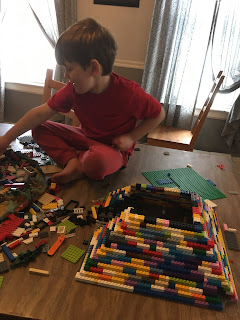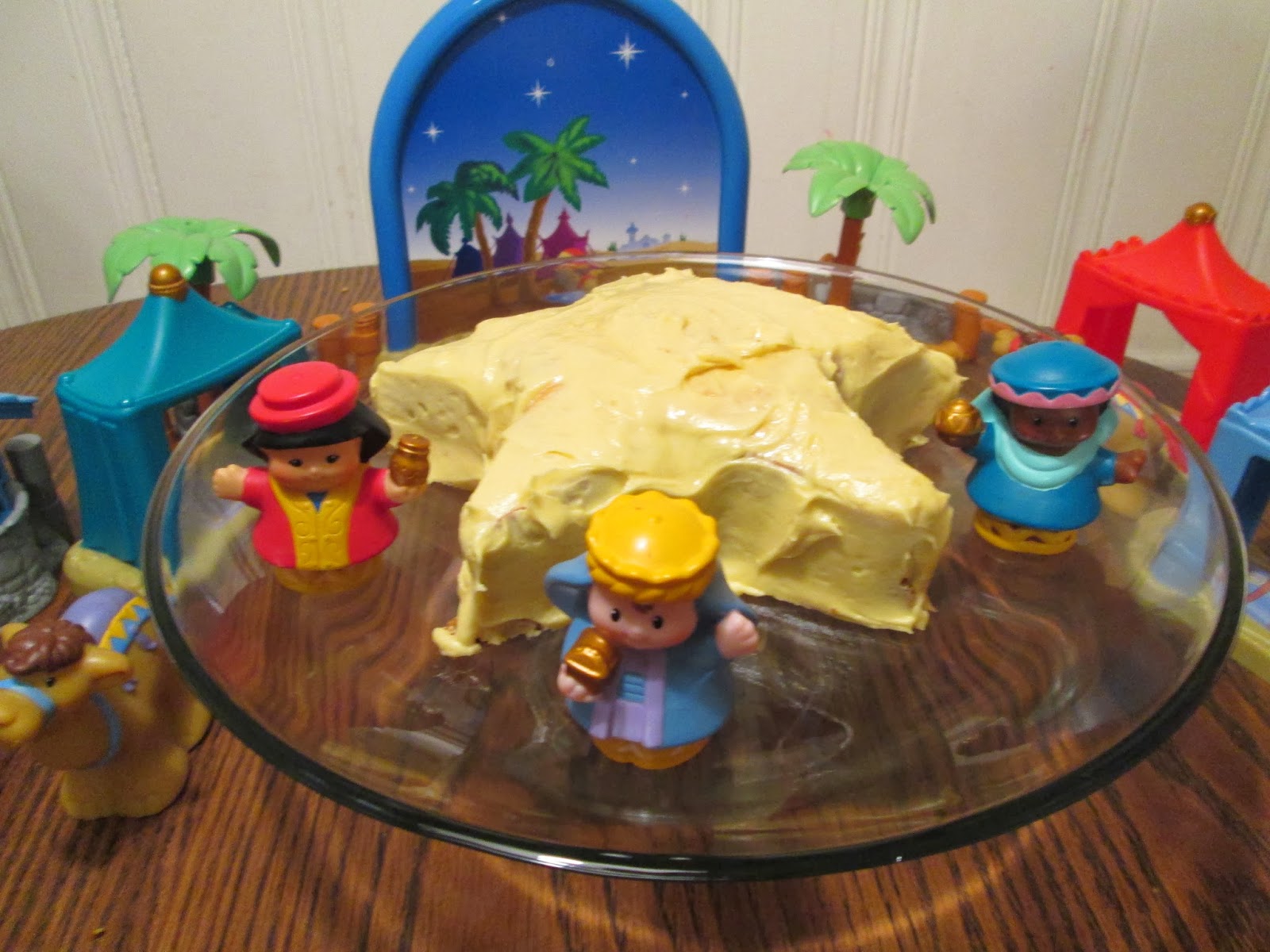In our engagement year and the early years of our marriage, my husband and I often had graduate studies work dates at noisy coffee shops. He always settled into his work immediately, voraciously reading his assignments for the next class. I, on the other hand, had to dig out a pair of earplugs from my bag before I could hope to have a chance of concentrating on Thomas Aquinas or Karl Rahner. 15 years and six kids later, I recently found myself working on a book review at a cafe, and I was delighted to discover that I still had a functional pair of earplugs in my bag! In fact, I needed them. I would have been headed to a quieter spot soon if I hadn't found them.
A few years ago, an older, childless friend of mine dropped in on our family in the morning of a non-school day. Four of my kids had been quietly, and with great concentration, playing with Legos at the dining room table for an hour or so. My friend and I were chatting away when a fight broke out over who was using what brick for what purpose, etc. My attempts to diffuse the situation were ignored, the loud argument resumed, and I eventually went back to talking to my friend. Rather than responding, however, she interjected, "I can see you LIKE noise! It's not even bothering you!"
I know she wasn't trying to offend me, but, well, I was offended, especially when she blamed it on my midwestern upbringing, suggesting that most parents on the East Coast know how to raise their children to be quiet. Apparently, I was doubly guilty, for being immune to noise and not successfully teaching my children always to be quiet. Ironically, I felt I was constantly reminding my children to be quiet! And I often found the noise of the household overwhelming.
Who enjoys the sound of squabbling siblings or demanding children? Who likes to hear a newborn crying to nurse or a toddler throwing a tantrum about being served milk in the wrong cup? Who wants 24 hours in a pediatric ER, listening to various children screaming in nearby rooms as they undergo painful bloodwork and medical exams? Do parents look forward to the sound of obnoxious, blasting teenager music or the grade schooler learning to play clarinet? No! We never set out to have a noisy household. And yet, we can accept it as part of our lives right now. It is a mortification, an opportunity to die to ourselves and offer to God a sacrifice of our own personal preferences.
Silence has long been praised by Catholic spiritual writers, and it remains a popular topic today as well. "Noise," however, has been expanded to include technology encroaching into our daily lives. This means that busy Catholic parents can now be scolded for being too tied to their phones, despite the expectation from schools, health providers, coaches, etc. that they always be available. Even with the increasing demands on our time, we busy parents often seem to be blamed for not being able adequately to prioritize our prayer life, which would be exhibited in quiet holy hours and silent retreats. And yet, while spiritual writers continue to emphasize the necessity of silence, very few offer to jump in and babysit for six kids, do three loads of laundry, help with homework, drive kids to basketball practice, and make dinner, such that this hour of free time would be possible on a daily basis.
Perhaps it is better for busy parents to look to someone like Fr. Walter Ciszek for inspiration. In his books He Leadeth Me and With God in Russia, we find the description of how this Polish-American Jesuit priest found himself condemned to hard labor in a Siberian prisoner camp in the mid-20th century. He had very little "choice" when it came to his daily activities of digging ditches or shoveling coal. He had no say in when he woke up or had meals. And yet, he did not give up his Catholic spirituality or Catholic priesthood in these circumstances. He found ways to offer his hard labor to God and even to minister to people by giving retreats, based on the Spiritual Exercises, while people worked. Fr. Ciszek didn't allow his situation to prevent him from seeking out and serving God.
Our situation is not really as dire as a Siberian labor camp, and yet, we too often find circumstances out of our control. As parents, we constantly find ourselves unable to follow the schedule we would like, and even when we try to organize our day to prioritize prayer, it may not work out. For example, I recently missed my planned daily Mass to take my five year old son to urgent care for staples in his head. As caretakers of children, we often can't control our circumstances. Thus many of us might benefit from the words of Fr. Jacques Philippe:
"We often live with this illusion. With the impression that all would go better, we would like the things around us to change, that the circumstances would change. But this is often an error. It is not the exterior circumstances that must change; it is above all our hearts that must change" (Part 2, 8).Thus if we have faith, we will see that God can reach us even in such imperfect circumstances:
"They will see that many of the circumstances that they thought negative and damaging to their spiritual life are, in fact, in God's pedagogy, powerful means for helping them to progress and grow...However many imperfections we may have, rather than lament them and try to rid ourselves of them at any price, they could be splendid opportunities to make progress -- in humility as well as in confidence in God and his mercy -- and thus in saintliness." (Part 2, 8.).Of course, we can continue to recognize the value of silence for the spiritual life, especially looking for the opportunity for our own personal times of prayer. But if a silent retreat seems out of our reach, or an hour of adoration seems impossible with the demands of family life, we should not be hard on ourselves. In humility, we can see that the willingness to embrace the noise and give up the silence can also help us to grow closer to God. In short, here are three points of summary:
- Silence is a good, and rightly praised. We should regularly re-examine our lives to determine if there are ways to fit in times of silence for personal prayer. I have great admiration for my friends who commit to a 4 a.m. hour of adoration or prioritize a half hour of quiet mental prayer before the kids awake. If we can make time for silence, we should.
- Noise can be embraced as a sacrifice. We don't have to like noise or grow accustomed to it in order for us to grow from it. But the constant noise of family life will benefit us most spiritually when we consciously offer it to God as a sacrifice that we are making to do his will. Noise might be part of God's pedagogy for us. Despite the tone of some spiritual writers, we are not inferior Catholics if we find ourselves unable to prioritize times of silent prayer. Rather, God might want to teach us how to find him in the midst of noise and chaos. He may desire an increase in our humility, recognizing the failures of our parenting and the need for greater dependence upon him.
- Our circumstances can and will change! Especially as parents of young children, our circumstances are constantly changing. We may be able to prioritize silence and silent prayer at certain times of our lives, though not at others. If we hold onto the value of silence, we can more willingly offer noise as a sacrifice and look forward to a time when silence is a better possibility for our lives.






